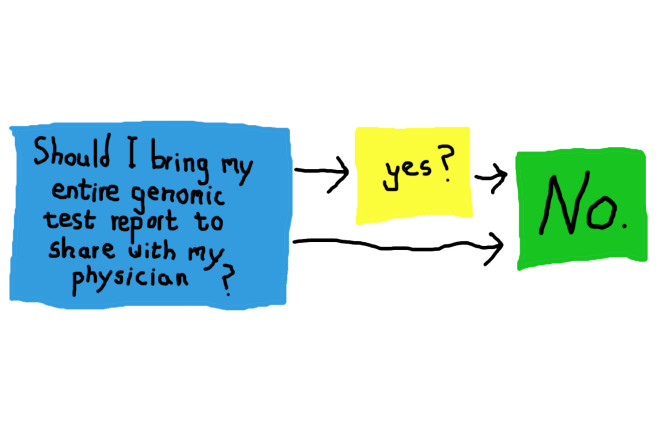Or why not to bring your entire genome sequence print-out to a doctor visit
Before there was Justin Bieber, or for those of us in Asia, any one the boys of a K-pop band, there was Lord Byron. To many of the women of the early 1800’s, as well as more than a few men, he was the epitome of romance. His noble birth, alluring poetry, spendthrift ways, his many loves, his foreign travels and adventures, all created- abetted by his active promotion- an image of exotic allure that captured the time. Even now if one’s love presents herself in a black dress, many points will be scored by repeating the opening lines to one of his most remembered poems,
She walks in beauty, like the night
Of cloudless climes and starry skies…
His reach extends even into today’s world of genomics, albeit tangentially and if one is willing to stretch a point. I count three connections:
The first of these links occurred during a rainy visit to the vacation home of the English Romantic poet Percy Shelley in Switzerland, where he and the Shelley’s competed in storytelling. It was on these inclement days, cooped up with Byron and friends, that Mary Shelley began the iconic novel, Frankenstein. We often call upon her novel today when comparing our modern use of genetics for recrafting life to Dr. Frankenstein’s efforts (though his were more needle, thread and lightening based), and in deriving the term ‘Frankenfood’ to describe genetically modified food.
Secondly, Byron’s only legitimate daughter, Ada Lovelace (née Bryon), wrote the first extant computer program. This program was meant to run on Charles Babbage’s mechanical computer, the “analytical engine”. Unfortunately Charles’ analytical engine was never built, and Ada’s program has yet to be run. Nonetheless she gets the credit for being the first computer programmer, and one of the key differences between genomics and its forerunner, genetics, is the necessity of computational power. Genetics deals with just a few genes at a time, genomics deals with all of them. Though I wouldn’t want to have to do genetic linkage analysis on Babbage’s contraption, our modern computers can trace a direct lineage back to his device, and to Ada Lovelace’s program.
And finally, Lord Byron defended the Luddites. This was a textile worker’s movement at the rise of the 19th century who claimed to follow in the footsteps of a Ned Ludd, and who smashed the new powered looms and mills that threatened their livelihoods. At that time, as well as now, to say that someone was a “Luddite” was a pejorative, impugning them with an unthinking rejection of technology and progress. However Byron championed them, and his debut speech before the House of Lords was to denounce a new act which would allow the death penalty for those who damaged a machine. His defense of the Luddites was that their frustration at being abandoned in the face of technological advances was worthy more of compassion than of capital punishment. He also wrote “Song For The Luddites “, which included the verse:
When the web that we weave is complete,
And the shuttle exchanged for the sword,
We will fling the winding sheet
O’er the despot at our feet,
And dye it deep in the gore he has poured.
Pretty strong stuff, though he told a friend that, “I have written it principally to shock your neighbor, who is all clergy and loyalty.” People like Byron tend to think of themselves as too clever by half.
Akin to Byron’s defense of the textile workers, let’s not dismiss an Annals of Internal Medicine editorial as being written by mere Luddites.
It is this defense for the Luddites that lets us connect Byron with genomics: inspired by Byron, I’m not going to dismiss an editorial in this week’s Annals of Internal Medicine as being written by mere Luddites. The editorial accompanies the research article “Consumer Perceptions of Interactions With Primary Care Providers After Direct-to-Consumer Personal Genomic Testing”. This new study surveyed 1026 people who have used a personal genomic service (like 23andMe), and the results were quite positive. About 80% of participants were very satisfied with their decision to be tested, and less than 15% thought that none of the results could be used to improve their health. Most found their results understandable, and for those who discussed the results with their doctor, few were dissatisfied with the discussion, and most found that their physicians were quite capable and willing to help interpret the results. Among the few (<20%) who reported a dissatisfying meeting with their doctor, 71% said their physician did not understand genetics well enough to discuss the results, and 90% said their physician was only willing to discuss somewhat or not at all the results. In contrast, those who had a good meeting with their physician reported the opposite, 71% said their physician did understand genetics, and all were at least willing to somewhat discuss the results.
My interpretation of the study is that everything looks surprisingly good, and we should all go out for a beer: most people were satisfied with the testing and their doctor. As only 27% of participants took their results within six months (the time period of this study) to ask their doctor’s opinion, that <20% dissatisfied with the discussion only represents 5% of all participants. We all know you can’t make all of the people happy all of the time, especially if you are only granted 15 minutes for your appointments. Some of these unhappy 5% would probably have been unhappy if their doctors had specialized in medical genetics, devoted all the appointment plus an extra five minutes to this matter, and gave them a lollipop at the end. Some physicians were probably not comfortable discussing a complex topic with no time to review their patient’s testing results. And a few of those physicians possibly are contrary and unlikable souls that would get a poor mark no matter what they are discussing. We can’t tell how many of that 5% fall into each category, but the numbers are low enough I shall not lose much sleep over the matter.
Have genetic tests “externalized … the costs of counseling and education” or do they simply give us a new type of information about ourselves?
The accompanying editorial has a different and more dyspeptic interpretation of the study, however. The editorial authors complain that the study’s results demonstrate that genomic tests have “externalized not only the costs of counseling and education but also the dissatisfaction consumers feel when their experience falls short of marketing promises.” This is akin to demanding that anyone who dares makes an advance in medical science also has to pay for educating the physicians as well as their clients, and to hold our hands while we adapt to the new knowledge. I don’t disagree with this sentiment, per se, though I wish the authors’ tone was less fractious and didactic.
Less easy to defend, the editorial additionally conjectures that the problem is not that the physicians are uneducated about genetics, but rather that the general populace is, and “professional societies should not need to take on this educational task, and physicians should not spend valuable time in the clinical encounter deflating a misguided marketing message.” Essentially the authors are saying, “We are not amused at having to discuss new types of medical information with our patients.” Fair enough, I suppose, however their solution is increased regulation of companies providing genetic testing and the production of educational material promoting the limitations of such testing. In terms of my recent posting on this subject, their response to this encroachment on their domain is an enclosure of our genome into the folds of government regulation and the medical profession, and the hopes that other people just stay out.
Though the editorial’s choleric style suggests that its conclusion is as much rooted in indigestion as in clear-headed reasoning, it raises a valid question: is a new technology responsible for easing its path into our world?
However, in the spirit of Lord Byron, who was not put off by the even greater less-than-polite actions of the Luddites, let’s not dismiss this editorial, even though its choleric style suggests that its conclusion is as much rooted in indigestion as in clear-headed reasoning. Though it is unusual to insist that a new technology is responsible for easing its own path into our world, is this an incorrect demand? Economists are fond of declaring that those worried about jobs lost via new technology or the globalization of the marketplace are not viewing the big picture; technology advances or new trade deals that increase productivity will raise the standard of living, on average, and are therefore a good thing. I don’t agree with this sanguine attitude. As I’ve told my children many a time, if someone tries to sell them the idea that it’s OK to hurt others because it’s “for the greater good”, they are to take two cautious steps back, and then start running. It’s that “on average” that’s the problem, as it means some real people are getting shafted. In this case, this is a small set of doctors and their patients. This is not to say that we should reject technology advances, or trade deals for that matter, but simply that we should listen to those that are on the front lines of these changes when they complain.
The editorial is correct, therefore, in its willingness to call a new technology in question. Instead of asking how we can best work with a new tool, it is better to instead demand it to work for us. Ivan Illich, Catholic priest and philosopher, had proposed the term ‘convivial tools’ to describe such human-centric technologies. These are technologies that let us improve our lives on our terms, and not terms set by others, and certainly not by the tool itself. Unfortunately he saw our world as being filled with an increasing number of non-convivial tools, technology that dehumanizes us, stratifies society and favors those with means versus those without. With our DNA being so central to life, it’s important to ensure that genomic testing is as convivial as possible.
Fortunately the overall favorable attitude of most participants to the genomic testing results and to their physicians’ responses suggests that further government regulation does not seem to be needed, at least in terms of the issues addressed by this study. However improved presentation of the results of genetic testing likely is in order. Test reports can be bettered in two ways, prioritization and simplification.
Physicians are overworked, and dropping fifty gene reports on them, each of which presents the data spread out over several web pages, and hoping this can be covered in a 15 minute appointment, … it’s just not going to go well.
Simplifying a gene report is the easiest. 23andMe, one of the genetic testing companies used in this study, offers a very large amount of information to accompany all of the alleles they test, but from my experience in designing genetic testing reports for physicians, what they desired was a single (one sided) sheet that simply expressed what the assay found, what were the other results possible and how the patient’s result compared to those, and what actions (if any) could be taken. Physicians are overworked, and dropping fifty gene reports on them, each of which presents the data spread out over several web pages, and hoping this can be covered in a 15 minute appointment, … it’s just not going to go well.
Which leads us to the other means of improving the doctors’ lives, how to triage a testing report? With hundreds of genes currently linked to human health and with many sites of variation in each of these that may be important, the standard way of assessing the reliability and importance of these tests and determining what a physician should do with the results cannot happen. This would entail clinical trials for all the gene variants, and there is neither the money, time, nor patient numbers to assess all these genetic variants in this manner. Furthermore, the number of gene variations linked to human health is expanding, so it’s not just a matter of waiting for the studies to be done, there will never be clinical trials to validate all these findings. Therefore the gene testing companies need to determine ways of filtering reports: which of the many heath related tests in a person’s report possibly warrant a look-over by one’s physicians? Given the newness of the science, this number is currently not over burdensome. Which results are health related and of personal interest, but too tenuous for most physicians to feel comfortable offering definitive advice? At this stage, most results will fall into this category.
Asking that genomic testing reports not make physician appointments more difficult than they already are is a reasonable request.
Though this triage is, to a degree, subjective, it is doable, and possibly worth doing. I imagine that if the cheerless 5% identified in this study had been able to come prepared with only one or two single sheets describing the genetic tests of greatest import to them, that 5% might have dropped. Admittedly, given the number of froward people in the world, and that any interaction between two people is still going to generate a certain baseline of discontent, I am doubtful of it dropping much. Nonetheless, asking that genomic testing reports not make physician appointments more difficult than they already are is a reasonable request.
At a poetry recital at my daughter’s school this week, one of the student’s “poems” was a translation of a song by the K-pop boyband, EXO-K. I was unmoved, but the students seemed appreciative. Byron would likely have approved- or been jealous, or set about to woo the lead singer. Probably all three, he was like that. Possibly too he would approve of efforts to ensure that technological changes leave control in our hands, and are not so complicated or disruptive that we, physicians and patients, must have it wrested from us and relegated to the demesne of the few. Though it is unlikely the Lord Byrons of our day will write a song in support of the physicians, I’ll pay attention at the next poetry recital, just in case.



